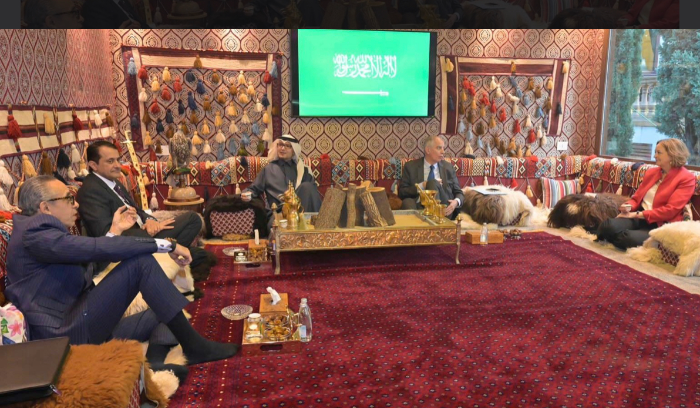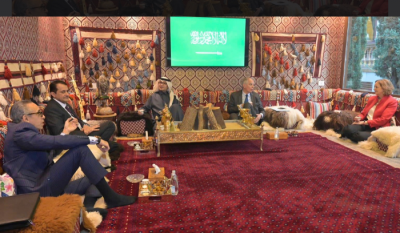Lebanese political circles hope that the initiation of the Quintet committee's ambassadors (the United States, France, Saudi Arabia, Egypt, and Qatar) in Lebanon, with a meeting with Speaker Nabih Berri tomorrow (Tuesday) at the request of French Ambassador to Lebanon Hervé Magro, will help end the forced grace period that continues to obstruct the election of a new president. This move comes amid a lack of communication between the parliamentary blocs belonging to the "resistance axis" and the opposition forces that had previously united behind the candidacy of former Minister Jihad Azour against former MP Sleiman Frangieh, supported by the Shiite duo, who remain steadfast in their nomination and show no willingness, at least in the short term, to engage in searching for a third candidate, as concluded by French presidential envoy Jean-Yves Le Drian during his recent visit to Beirut.
It remains unclear whether the opposition forces, along with the Democratic Gathering (led by MP Taymour Jumblatt) and the National Bloc (headed by MP Gebran Bassil), will maintain their commitment to Azour's candidacy or whether they view this commitment as a means to open the door for a consensus on favoring a third presidential option. Nonetheless, the majority of MPs from the Lebanese Forces party and the National Bloc affirmed, during their participation in the legislative sessions dedicated to passing the current year's budget law, that they are insistent on supporting Azour's candidacy.
Azour is Determined to Move Forward
However, the opposition's and the National Bloc's insistence on Azour's nomination, which he communicated to the MPs he met while in Beirut during the holiday season, faced a divergence from the position of former Progressive Socialist Party leader Walid Jumblatt, who announced that he would not oppose the election of Frangieh or anyone else, provided that the consensus on his election receives support from a significant parliamentary block. Jumblatt is not inclined to endorse a president lacking backing from either of these blocks, as he seeks to avoid entangling the Democratic Gathering in a conflict with the Christians, a stance he communicated to Frangieh during a gathering in his home in Clemenceau. Thus, it would be inaccurate to suggest that he has shifted in favor of Frangieh.
Jumblatt's Distinction
Therefore, it is unjust to place undue burden on Jumblatt, based on his new position regarding the presidency, because what matters to him above all else is ending the vacancy in the presidency, but not at any cost. Otherwise, he would not have conditioned his support on a president having support from a significant Christian parliamentary block.
The commencement of the Quintet ambassadors' tour of the heads of parliamentary blocs is aimed at urging deputies to agree in favor of favoring the third presidential option, without adopting any candidate themselves to ensure they do not interfere in the presidential election, which is ultimately the decision of the deputies.
According to information obtained by "Asharq Al-Awsat," the Quintet's move aims to reactivate the presidential file to assess the willingness of parliamentary blocs to agree on a consensus president who meets the specifications previously outlined by the Quintet, as well as to gauge their readiness for a new approach to resolve the presidential election impasse, differing from what they communicated to Le Drian in their meetings, allowing the Quintet in their meeting at the level of representatives of the five countries to build upon possible outcomes rather than reverting to square one.
No Differences Within the Quintet
Additionally, the quintet's ambassadors seek to inform the parliamentary blocs that there is no basis for betting on any internal differences within the quintet that could justify their adherence to any options prolonging the presidential vacancy, indicating that Qatar is aligned with the other member states of the committee—a fact confirmed by its ambassador to Lebanon, Saud bin Abdul Rahman bin Faisal Al Thani, to the leadership of the Marada Movement, as learned by "Asharq Al-Awsat" from a parliamentary source closely connected to Frangieh.
Regarding the speculation about the potential inclusion of Iran in the quintet due to its political influence in Lebanon through the resistance axis dominated by Hezbollah, a senior source within the quintet confirmed that the addition of Iran to the committee is not on the table. They stated to "Asharq Al-Awsat" that France and Qatar share roles in their communications with Tehran and Hezbollah, and they have continuously consulted with the latter to convince him not to tie the presidential election to the war in Gaza and its extension to southern Lebanon, as such a connection would delay the election for a long time.
The Balance for a Third Option
Until the five ambassadors conclude their tour in preparation for the upcoming Quintet meeting at the level of representatives of member countries, the balance remains in favor of the third presidential option, despite Frangieh's commitment to continue his candidacy with no indication of withdrawal, suggesting that competition will be between him and Army Commander General Joseph Aoun.
The question remains: Will the Quintet manage to create a breakthrough in the deadlock that continues to obstruct the presidential election, or will the presidential vacancy persist until the situation on the Gaza front is clarified? This might depend on whether Tehran intervenes with its ally Hezbollah to soften its stance in a way that would separate the path of the presidential issue from the broader conflict stemming from Gaza to southern Lebanon, especially in the absence of international guarantees to contain Israeli Prime Minister Benjamin Netanyahu’s ambitions for expanding the war toward the northern front, while Lebanon, in its current state, cannot bear the costs associated with such an expansion amid rising internal division as the opposition accuses Hezbollah of holding the decision of peace and war, contrary to the caretaker government's efforts to mitigate its political burdens with the international community.
Finally, there are those who are closely monitoring international efforts to end the war in Gaza; as its cessation could open wide avenues for the Quintet to intensify their efforts to achieve a safe election of a president.




